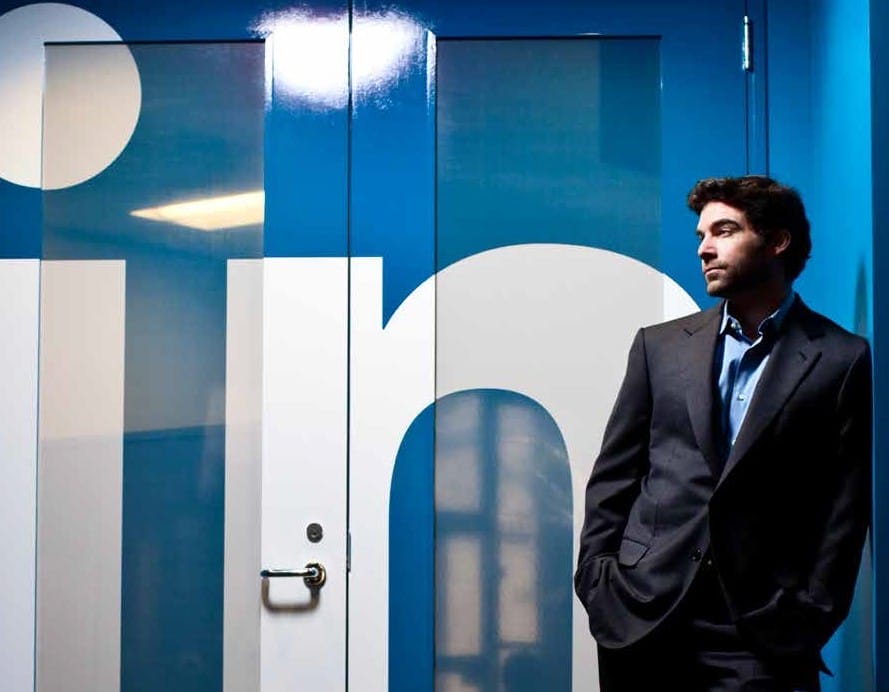LinkedIn has recently passed 200 million members. It has had tenfold growth in revenue over the past four years, an IPO success, seven consecutive quarters beating analyst estimates and, the latest, and greater than 1 billion uses of its newest functionality (endorsements). Though as CEO for the past four years, Jeff Weiner, W’92, is too humble to take the credit, he does accept responsibility for articulating and implementing the social media firm’s stunning vision. Essentially, he has disrupted the talent recruitment business—and plans to stop nothing short of revolutionizing the labor market itself.
WHARTON MAGAZINE: How would you describe what you’re trying to accomplish at LinkedIn?
JEFF WEINER: LinkedIn was founded as a professional graph that connected professionals up to three degrees. However, that’s just the beginning. We actually believe that longer term we’re in a position where we can map the global economy. The points on that map would be all of the economic opportunities in the world, full-time and temporary, all of the skills required to obtain those opportunities and all of the companies offering those opportunities. Lastly, we want to overlay on top of that all of the professionally relevant knowledge that is possessed by those individuals. And then we want to allow capital—intellectual capital, working capital and human capital—to flow on that graph to where it can best be leveraged. In doing so, we believe we can take much of the friction out of those traditional flows and help lift the global economy.
WM: How much does altruism play into those end goals?
WEINER: I wouldn’t characterize it as altruism so much as a belief in our vision. Our vision is to create economic opportunity for every professional where a professional is defined more broadly as someone that earns a living from their skill. We can’t think of anything more profoundly important or sustainably valuable to our members than creating economic opportunity for them because it not only improves the quality of their lives, but also the lives of their family members. And they, in turn, can create economic opportunity for others.
WM: Which of your personal qualities can explain how you’ve propelled to such heights at such an early age?
WEINER: I don’t necessarily think about it in those terms. But what I would say is, one of the questions I’m asked most often by students and by interns is what advice I have for them in terms of their own career path. First is the importance of knowing what it is you ultimately want to accomplish and optimizing that objective for both passion and skill (and not one at the exclusion of the other). Second is surrounding yourself with great people, only the best, and the third is to always be learning.

WM: As a Penn undergrad, did you have such career focus?
WEINER: I did. One of the reasons I chose Penn was the desire to end up in a role where I could amass enough influence and resources through the private sector that I could help influence and reform education. I was very passionate about that and made a very conscious decision. Later while at Penn, I took an entrepreneurial management class, and along with a friend of mine in the class, was assigned to three engineers from DuPont who wanted to develop a desktop video teleconferencing system leveraging this thing called the Internet. This was before the Web had been commercialized. We had a chance to really learn a lot from them. I went home for winter break that year, and I remember bumping into a friend of mine who was talking about what a browser-like capability would do in terms of making the Web more mainstream. And I remember thinking about how large an opportunity that could be. I’ve always kind of had media in my blood. My father worked at CBS for 20 years. This convergence between media and technology to me felt like a really interesting way of helping to level the playing field and democratizing access to information. And it really started to pick up in roughly ’94. I was in a strategic management consulting firm, and I remember reading The Wall Street Journal, and there was this new section called Marketing and Technology. And I was thinking to myself, I don’t just want to be reading about this stuff. I want to actually be there with these companies working with the executives making the decisions and helping to steer these companies through this really exciting time where this convergence was taking place.
WM: Do you learn from other social media companies’ mistakes or successes?
WEINER: We definitely try to pay attention to the landscape. And it’s not just social media companies. I think there are always things to be learned from the way other companies are doing things, from the successes that they’re having, from the things that they’re learning from. I think you’re always going to draw upon and learn from your own personal experiences too. Some of the most valuable lessons I’ve learned are what not to do.
WM: Like what?
WEINER: I’ve learned about the importance of focus. I’ve seen a lot of hypergrowth companies in the Valley. One of my favorite expressions in business is that managing a hypergrowth company is like launching a rocket into space. If you’re off by a few inches at launch, you can be off by miles out in orbit. As a result, in those situations, it’s really important to focus on defining your core and doing fewer things better. It also means investing in a firm foundation to support that focus. And that’s going to be your talent, your processes and your infrastructure and making sure that all three of those areas are going to scale.
WM: How often do you still get asked about filling the shoes of Reid Hoffman [founder of LinkedIn]?
WEINER: At this stage, it’s less about that and more about realizing the full potential of the platform. That’s essential to both Reid and me.
Read about the four other Whartonites “Putting Knowledge Into Action.”
























